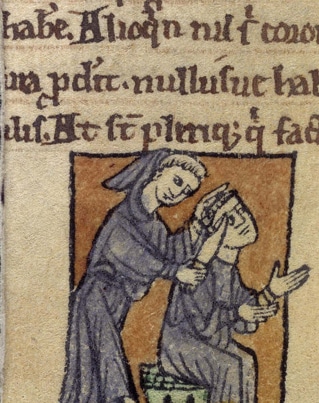 Over at The Art of Manliness there is an interesting entry about shaving. Under that entry we find this about beards, shaving, and the Early Church [with my corrections to the Latin]:
Over at The Art of Manliness there is an interesting entry about shaving. Under that entry we find this about beards, shaving, and the Early Church [with my corrections to the Latin]:
While the ancient Jews and Muslims were commanded not to shave off their beards, the acceptability of beards among the early Christians waxed and waned.
Sometimes beards were seen as symbols of piety — other times as diabolic. In the faith’s early days, the beard took on the former meaning. A man who decided to devote himself to a monastic life would often undergo an initiatory first shave (in addition to the tonsure — the cutting of the hair on the crown of the head) that was observed by the other monks in the monastery. Before the shave, a prayer called the benedictio ad barbam, or “blessing of the beard” would be said. One version used in the Abbey of Bec in France went like this:
Dominus vobiscum.
Oremus, Dilectissimi, Deum Patrem omnipotentem, ut huic Famulo suo N., quem ad iuvenitem perducere est aetatem, benedictionis suae dona concedate; ut, sicut exemplo Beati Petri, Principis Apostolorum, ei exteriora, pro Christi amore, sunt attondenda iuventutis auspicia, ita praecordiorum divellantur interiorum superflua, ac felicitatis aetermae percipiat incrementa. Per eum qui unus in Trinitate perfecta vivit et gloriatur Deus per immortalia saecula saeculorum. Amen
[…]
After their initial shave, monks were put on a strict shaving schedule. In a convocation held in 817 AD, French monks decided that they should shave once a fortnight, but would take part in an occasional razor and shaving fast during certain times of the year.
[…]
Does anyone want to take a crack at a perfect and smooth English version?


































Capuchin Constitutions of 1536: “The brothers shall wear the beard, for it is something manly, austere, natural, an imitation of Christ and the saints of our Order, and despised.”
Let us pray, beloved, to God the Allmighty Father, that to this servant of his N., whom He has deigned to bring to a young age, He may grant the gifts of His blessing; so that in accordance with the example of Saint Peter, the Prince of the Apostles, as the exterior signs of his youth are about to be trimmed, thus the interior excesses of his being may be plucked, and may he gain the riches of eternal happiness, through Him who in perfect Trinity lives and is glorified through all eternity, Amen.
[… quem ad iuvenitem (juvenilem) perducere (dignatus) est aetatem, benedictionis suae dona concedate (concedat) … ]
The Capuchins may also have been influenced by the Camaldolese hermits, with whom they took refuge, who also traditionally had beards. Of course, St. Francis had a beard though a thin one. The monks of the Eastern Rite traditionally do not shave. I read somewhere that initially in the Roman Empire beards were associated with barbarism, an attitude that survived in the West but not in the East. I don’t know if the early Irish monks shaved but their tonsure was different from that common elsewhere in the West in that it ran from ear to ear! One might need a prayer for a steady hand with that kind of shaving.
I must say, the spelling mistakes really got me. This is why I’m rubbish at reading manuscripts. I still unfortunately need my Latin in a clear and pristine typeface with no errors. It seems I still have a ways to go. (Says the guy working through a book on New Testament Greek…)
Anyways:
Let us pray, most beloved, to God the Father almighty, that to this servant of his N., whom [He deigned] to lead to a young age, may he concede the gifts of his blessing; that, just as by the example of Blessed Peter, the Prince of the Apostles, for him the exterior signs of youth, for the love of Christ, are to be trimmed, and thus the excesses of the interior heart may be torn away, and also that he might gain the fruits of eternal happiness. Through him who lives as one in the perfect Trinity and is glorified as God through the immortal ages of the ages. Amen.
Let us pray, beloved, to God the Almighty Father, that He may bestow upon this servant of His, N, brought forward through His grace in the days of his youth, the gifts of His blessings. May he, as it was with St. Peter, the prince of the Apostles, offer to Christ the outward proof of that youth, even as he seeks to discard the excesses of the heart in the fruitful pursuit of eternal happiness. Through the Perfection of The Three who abide in all glory as One God through Eternity: Amen!